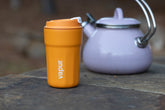Up to three quarters of people in the U.S. consume less water than they need to per day (13 ounces of fluid for men and nine for women are recommended by the Institute of Medicine). Chronic dehydration is dangerous because major organs like the skin, kidneys, and liver, require water to work efficiently. Water is also necessary to keep tiredness, headaches, high blood pressure, and other health issues at bay. When you are dieting, staying hydrated is particularly important because during this time, you are flushing fat from the body and water can help with this process while also helping to decrease the appetite and reduce fluid retention. How can water help you achieve your goals and how can you make it easier to stick to the recommended amounts?
Water and Appetite Suppression
One way to make dieting less of a chore, is to ensure you feel satiated throughout the day - and water can be an invaluable ally in this sense. Research by the American Chemical Society has found that drinking just two eight-ounce glasses of water before meals helps people shed pounds. The researchers stated, “We found that over the course of 12 weeks, dieters who drank water before meals, three times per day, lost about five pounds more than dieters who did not increase their water intake.” The secret seems to be twofold: the ability of water to make people feel full, and its ability to take the place of high-calorie beverages such as soda,
Water during Fasting
The International Food Information Council reports that 43% of Americans are now following a specific diet or eating pattern and that the top diet followed in 2020 was intermittent fasting. The key to intermittent fasting is to focus on when (rather than what) to eat and it may involve foregoing food for as long as 24 hours twice a week. Intermittent fasting has been found to wield various benefits - including better fat burning, weight loss, brain benefits, and a lower risk of developing Type 2 diabetes. Because a fast often involves eating no food for a specific period, it is important to stay hydrated by consuming more liquids. Before commencing, talk to your doctor - they may recommend beverages such as broth, tea, or soups which are water-based but which have additional nutrients (such as electrolytes) that can help you balance your pH levels, regulate muscle contractions, and keep you hydrated.
Choose Your Beverages Wisely
Diet sodas enjoy great popularity in the U.S., owing to their ability to offer a refreshing experience with zero calories. If weight loss is on the agenda, however, take note. A 2015 study published in the Journal of the American Geriatrics Society found that increasing consumption of diet soda is linked to greater abdominal obesity in older adults. Belly fat is strongly linked to metabolic syndrome and cardiovascular diseases so if you love this beverage, keep it to a minimum.
Water can be an invaluable ally when you are dieting as it can help you feel full and flush out fat from your system. When dieting or fasting, it is important to stay hydrated and to drink water or other healthy liquids. Simple broths and teas (as recommended by your doctor) are a good start, while diet sodas should be consumed with significantly less frequency.



